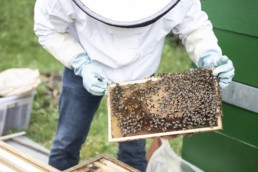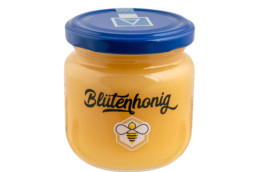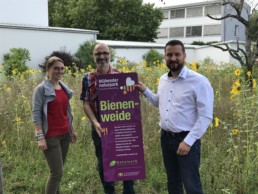Project "Bee pasture"
Natural flower meadow and company honeybees at the Güglingen site
In many areas, insects no longer find suitable habitats with a sufficient supply of pollen and nectar due to increasing development and intensive agriculture. A long-term study* published in 2017 showed a dramatic decline in native insects of more than 75 % – many wild bee species are already facing extinction.
With its commitment, AFRISO wishes to contribute to counteracting the threat of insect kill. For this reason, management decided in 2018 to give even more room to environmental and nature conservation on the 3-hectare site of the Güglingen plant. Currently, 35 % of this area are covered by buildings, 30 % are traffic areas and parking lots and 35 % are park-like green space. This is often used by employees for rest during breaks and is deliberately kept free as a “green lung” in the middle of the commercial space.
Flowers providing pollen and nectar for bees, bumblebees, butterflies and other insects
An area of approximately 300 m2 of the green space was redesigned as a natural flower meadow according to ecological criteria for the project “Bee pasture”. Predominantly native wildflower species, but also typical regional horticultural crops such as marigolds, sunflowers or burclover were used as seeds. This special blend is characterized by a long-lasting flowering period, thus ensuring the health and nutrition basis of flower-seeking insects until October.
Less is more: Reduced tillage creates the best conditions for the reproduction of insects
AFRISO was the first company in the nature park to receive the official sign “Bee Pasture” of the Stromberg-Heuchelberg Nature Park. The sign signals to passers-by and co-workers that this wild meadow is not the result of chance or negligence, but was created intentionally. (from left to right: Julia Meny and Dietmar Gretter (managing director of the Stromberg-Heuchelberg Nature Park), Frank Altmann (Marketing Manager AFRISO)
Much of the success in the fight against insect kill is attributable to the type of tillage of the meadow areas. Therefore, the new AFRISO flower meadow will be mowed only twice a year and in line with the insect season. When the flowers have died in autumn, the plant stems serve as a nesting or as winter quarters. This is followed by the first mowing in March after the insects have hatched. The second cut in June serves to increase the seeds and ensures flowering over the summer. The mown off material is always cleared in order to keep nitrogen from being supplied to the soil and to ensure optimum growth conditions for slowly growing wildflowers or herbs. There is no further tillage which helps wild bees to survive because more than half of all wild bees nests underground and thus relies on “rest” in the soil.
AFRISO honeybees
For AFRISO, the term “sustainability” is not just another phrase, but an integral part of the corporate and product philosophy. Our fields of activity flue gas control, energy savings, groundwater protection and conservation of resources underpin our mission to protect the environment.
Bees play an important role in preserving the ecosystem as we know it today: Nearly 80 % of all plants are pollinated by honeybees. The remaining 20 % are pollinated by bumblebees, wild bees, butterflies and other insects. The pollinating performance of the honeybee secures the diversity of nutrition for humans and is thus a main constituent for good harvests and natural biodiversity. However, the population of honeybees has been in danger for years. In Germany, there have been significant declines in bee colonies over the past 25 years. Additional research may be required to understand all causes for this, but several reasons are obvious even today: parasites such as the Varroa mite or the disproportionate use of pesticides certainly do their part and make commercial beekeeping increasingly unprofitable. This cannot be compensated by the pleasingly increasing number of hobbyist beekeepers.
As a family-run company, we are firmly rooted in the region and like to take responsibility for people and nature. Therefore, in the year of our 150th anniversary, we decided to invest in keeping honeybees. In the future, the AFRISO honey produced by the company’s own honeybees will be used to promote the project “bee pasture” and inspire as many people and companies as possible to be involved in the conservation of ecological biodiversity.


* The study “More than 75 percent decline over 27 years in total flying insect biomass in protected areas“ was published on October 18, 2017 in the journal of science PLOS ONE. Numerous volunteer entomologists collected scientific data on insect decay at more than 60 locations in Germany between 1989 and 2015. Leran more.
Project "Bee pasture" - photographs
Just in time for the 150th anniversary of the company and the beginning of the insect season 2019, the “bee pasture” was “handed over” to wild bees and company bees as well as bumblebees, butterflies, wasps, beetles and other insects.


March 2019: After the turf was removed, the soil was ready to be prepared for sowing.

April 2019: The AFRISO bees move into their new habitat near the bee pasture.


April 2019: The AFRISO bees move into their new habitat near the bee pasture.


May 2019: The "carpet of flowers" is growing.

June 2019: With its flowers providing pollen and nectar, the bee pasture
offers a new home to all kinds of insects. No more lawn, but an abundance of wildflowers, clover and sunflowers on 300 m2 of meadow.


July 2019: The honeycombs are almost filled and the honey can be harvested soon.

This dead pear tree on the flower meadow is full of life: Many beetle species feed on rotting wood, wild bees use it for nesting.




